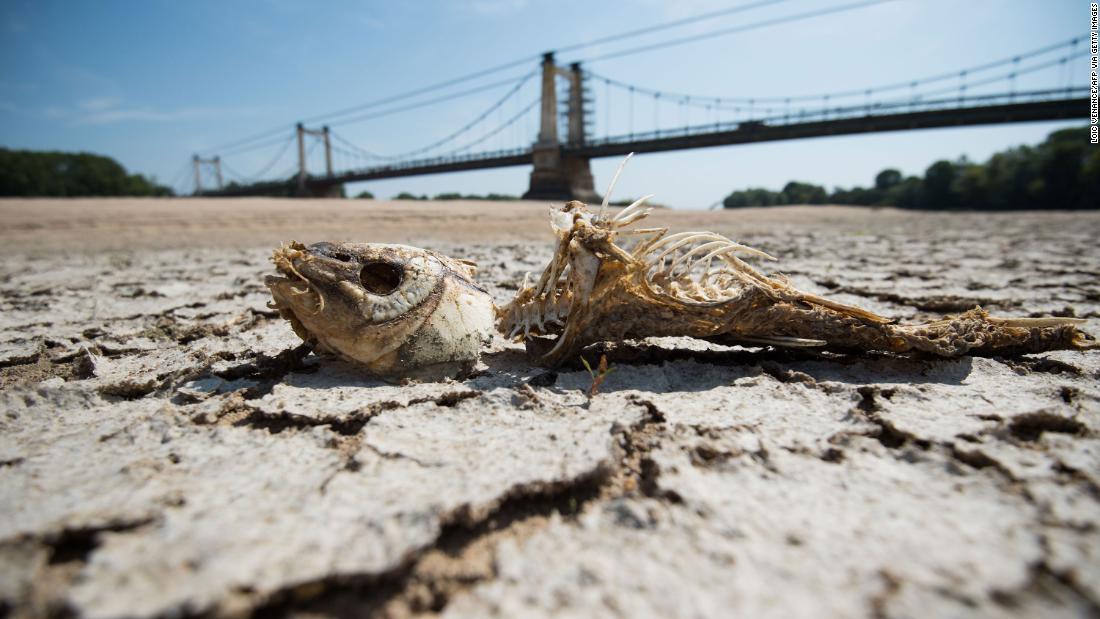NASA will measure sea levels from space 2:09
(CNN) ––
Summer weather could last for half a year by the end of this century if mitigation efforts are not made against climate change, a new study warned.
For nearly the last 60 years, summer has spanned an average of 17 days across the world.
“Summers are getting longer and hotter.
While winters are shorter and warmer due to global warming, ”explained Yuping Guan, lead author of the study.
The new climate commitments are "very far" from meeting the goals of the Paris Agreement, warns the UN
Sure, the idea of longer summers may sound great for a family vacation or enjoying the great outdoors.
However, the fact that this season is extended could significantly affect our health, the environment and agriculture.
Heat waves could drag on.
Also, mosquito-borne diseases could spread even further.
Not to mention, the season for pollen allergies could become more severe and the growing season for crops will be longer.
Summers get longer
The study reveals that global warming has made the hottest quarter of the year, which we call summer, longer.
And this also affects the start of all seasons.
"Early spring and summer are early, while early fall and winter are delayed," the study said.
advertising
The research divides the four seasons into four percentiles.
Any temperature above the 75th percentile of the average temperature between 1952 and 2011 is characterized as summer.
Then, computer models of the climate are used to reveal how these defined seasons change over time.
«During the period 1952-2011, the length of summer increased from 78 to 95 days.
Meanwhile, that of spring, autumn and winter decreased from 124 to 115, 87 to 82 and 76 to 73 days, respectively, ”the study stated.
https://dynaimage.cdn.cnn.com/cnn/animations/w_1100,ac_none/210322090129-desktop-climate-summer-longer.mp4
Most regions in the Northern Hemisphere have already experienced longer summers.
However, in the Mediterranean region it is increasing more than eight days every 10 years since the 1950s. This may not sound like much.
However, on a longer time scale the figure becomes more significant.
Global land and sea temperatures continue to rise relative to average.
In addition, the difference compared to the average also increases.
The last time annual temperatures were below the global average was in the late 1970s. Which means more than 40 years have passed since it was warmer than normal, according to data from the National Oceanic Administration. and US Atmospheric (NOAA).
Climate change, driven by greenhouse gas emissions, is the main contributor to rising temperatures.
If nothing is done to mitigate these emissions and slow the effects of climate change, then summer could evolve, the study said.
To the point of lasting half a year at the end of this century, he added.
A virus can be a weapon to fight cancer 27:37
«In a scenario in which these conditions are maintained, by the end of the century spring and summer will begin approximately one month earlier compared to 2011. While autumn and winter will begin about half a month later.
Which results in almost half a year of summer and less than two months of winter in 2100. '
Countries around the world are trying to take action.
However, the targets set in the Paris Climate Agreement are not being met.
Which include efforts to curb emissions.
What this effect of climate change means to you
Apart from the increase in temperatures and the change of seasons, these situations have consequences for human life.
That includes agriculture.
Spring is the season when plants begin to grow in parts of the US Plants sprout when they experience warmer temperatures early in the season.
However, this time of year also encounters temperature variability.
That is, when one day can be warm while the next is cold.
These extremes of temperature are very common with climate change.
Climate change is making pollen season and your allergies worse
The fact that spring starts a month earlier could mean disastrous losses for crops.
The first weeks and months in the transitional seasons could result in more drastic cold spells, after the spring shoots begin.
“For areas with monsoons, changing seasons can alter the monsoon season.
This means that the patterns of monsoon rains also change.
These kinds of changes may not be synchronized with the growth of the crops, "Guan explained to CNN.
"It could also limit the types of crops that are grown, encourage the growth of invasive species or weeds, or increase the demand for irrigation," said the Environmental Protection Agency.
'A longer growing season could also alter the function and structure of ecosystems in a region.
And it could, for example, affect the range and types of animal species in the area, 'he added.
There are other types of plants, such as ragweed, that produce pollen.
A prolonged period of warmer temperatures would allow plants to generate pollen for longer and in greater quantities.
Hurricanes now take longer to degrade inland 1:44
The change in seasons will also have an effect on wildfires and heat waves.
Probably increasing its occurrence.
"A longer and hotter summer will have more frequent and intensified high-temperature events: heat waves and forest fires," said Congwen Zhu, a researcher at the Chinese Academy of Meteorological Sciences, who was not part of the study.
Heat events are already, on average, the most lethal with respect to other weather events, such as floods or hurricanes, in the US This according to information from the National Weather Service.
The research also looks at how mosquitoes could be affected by longer summers and warmer temperatures at higher latitudes.
According to the Intergovernmental Panel on Climate Change, mosquito-borne diseases, such as dengue, could become widespread in a warmer climate.
Also, the period of the year in which it spreads could be extended.
global warming climate change summer






